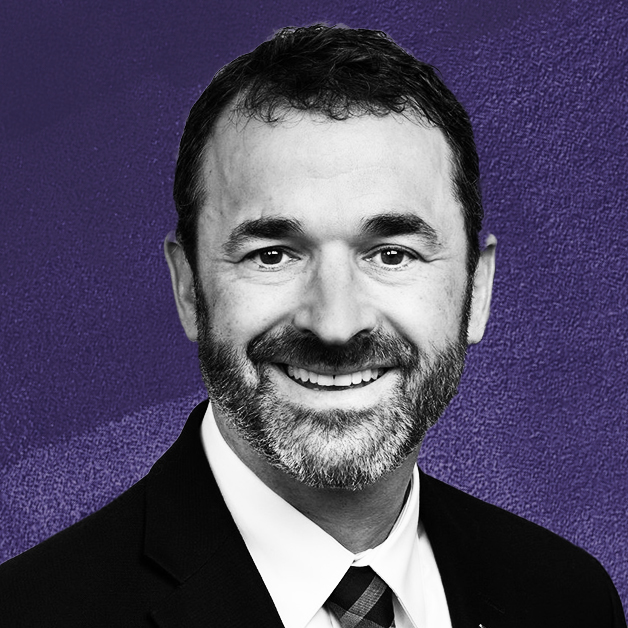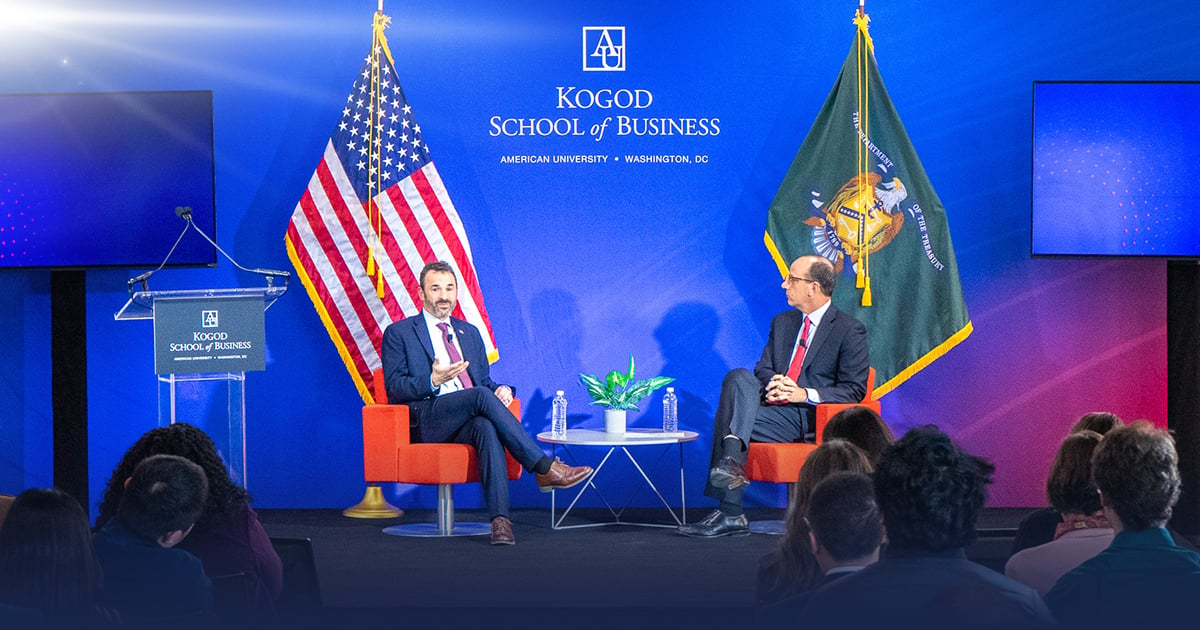
Kogod School of Business
When most Americans think of the IRS, they probably don’t think of the type of digital-first, tech savvy agency Danny Werfel is building. Werfel, the fiftieth and current commissioner of the IRS, is well aware of the public perception challenges the agency faces—likening the IRS to “the NFL referee of the government.” Part of his role in the years to come is to change that.
To mark the one-year anniversary of his role as Commissioner, Werfel spoke to a packed room at American University’s Veloric Center for Entrepreneurship about his plan to create an IRS that is modern, accessible, and equitable. The keystone, he said, is the full digital transformation of an antiquated system.
Commissioner Werfel’s presentation, titled “The Future of the IRS: Transforming for a Digital World,” explored how the IRS got to its current state, how he hopes to bring the agency fully into the twenty-first century, and how young people like the students in the audience could be part of the agency’s transformation.
After his remarks, Werfel sat down with Kogod dean David Marchick for a fireside chat and explained that the next era of the IRS is one in which students from all academic backgrounds—from accounting to management to data analytics—can find a foothold, should they choose to pursue a career in public service.
“The modernization of the IRS is a generational imperative,” Werfel said.
With sixty billion dollars in funding granted by the 2022 Inflation Reduction Act, the IRS is focused on developments in three critical areas: access, accountability, and trust restoration. This includes making technological and workforce investments, with the two-pronged goal of automating repetitive processes and having employees engage more with communities across the country. Werfel’s ultimate objective is to create a high-functioning digital platform that serves as a one-stop shop for all taxpaying needs, as well as a robust workforce that is doing impactful work on the ground.
A digital IRS does not mean we’re walking away from service. It means we have more time to spend with people who need our assistance most.”

Danny Werfel
Commissioner, Internal Revenue Service
For inspiration on how to best deploy digital tools for the IRS, Werfel looked to the many service options provided by banks today. His parents, both in their eighties, have never banked online, while his children in their twenties have never stepped foot in a brick-and-mortar bank—yet all of them have their banking needs met. Werfel aims to create a similar paradigm for paying taxes, where taxpayers can engage with the IRS exclusively digitally if they want to—and have accessible and efficient ways to interact with the agency if they don’t. When Dean Marchick wryly remarked that his ninety-year-old father files his taxes by mail and then calls the IRS every day to ask when he’ll get his refund, Werfel promised that he’d still be able to do that, even if it’s not very efficient. Most people, he hopes, will take advantage of digital tools like “Where’s My Refund” on the IRS website.
“This is about meeting people where they are and making sure they have options,” he said.
These technological advancements didn’t happen overnight, and the IRS still has a long way to go to fulfill the commissioner’s vision. When Werfel was appointed last year, he was told that he would oversee one of the most important tech-enabled transformations of a government agency in US history. In the past year, the IRS has improved its web experience and call center efficiency, decreased processing times for tax refunds through direct deposit, and launched a pilot program for Direct File, which allows for free online tax filing with the IRS rather than with a partner website like TurboTax.
“We’ve launched more digital tools in the last two years than we did in the previous twenty,” Werfel said.
And there are more digital tools and resources to come. The IRS is already developing ways to counter phone scams and give people the ability to easily report them, as well as technology to better determine when a tax situation needs to be audited. Besides speeding up these processes, these developments also play into the larger goal of restoring trust in the IRS; if people are subjected to fewer confusing phone calls and unnecessary audits, they might just start viewing the organization with less resentment.
To Werfel, that trust can’t happen without the IRS ensuring fairness, especially among underrepresented groups. Low-income people and the elderly are more frequently targeted by tax scams, often involving a phone call and a financial demand from somebody claiming to be from the IRS. Additionally, a Stanford study in 2023 revealed that Black Americans are significantly more likely to be audited as a result of internal IRS algorithms. Add to that the fact that the United States’ highest-earning people have historically been able to sidestep filing their taxes altogether, and it’s no wonder that distrust in the IRS runs deep; Werfel was told early in his appointment that many people don’t open mail from the IRS out of fear of what’s inside.
No issue is more important than fairness. If we’re not comprehensive, underserved groups will fall through the cracks.”

Danny Werfel
Commissioner, Internal Revenue Service
What does being comprehensive entail? Above all, Werfel says, it’s about spending time with the people the IRS is trying to serve. It’s easy to view the IRS as a faceless entity rather than a large group of employees; that can’t change until those employees have the bandwidth to engage directly with communities and learn firsthand what they need. Werfel himself had the chance to do just that during the event itself; during the question-and-answer session, an international AU student described the challenges of paying taxes as a non-citizen with American tax obligations, and Werfel acknowledged that the needs of every taxpayer group must be heard and addressed.
More than anything, Werfel believes in the IRS’s positive impact. When asked why he left his job in the private sector to work in what Dean Marchick described as “one of the worst jobs in government,” he explained that he is inspired by the IRS’s workforce, which is ready for change and eager to make community connections. Where the IRS was once solely focused on assessment and tax collection, it is now looking for ways to utilize its role in reducing child poverty, increasing healthcare access, and addressing climate change. That couldn’t have happened, Werfel says, without the passion of the IRS’s people.
“Nothing gets done at the IRS without the workforce,” he said.
Werfel left the students in the audience with the assurance that whatever their discipline or their goal, there’s a place in the IRS for anybody who wants to do impactful work. Werfel encouraged the university’s future finance and accounting experts, data analysts, and management pros alike to apply, as long as they’re interested in finding new ways to make a difference. For the IRS to truly be brought into the twenty-first century, it needs the ambition, know-how, and drive for a better world that AU’s students demonstrate every day.
